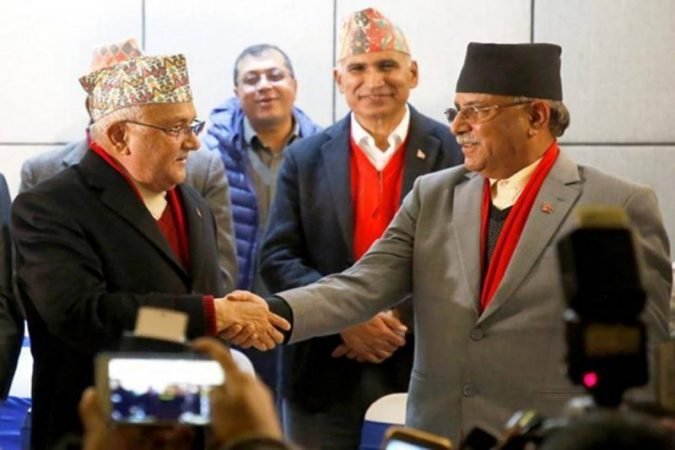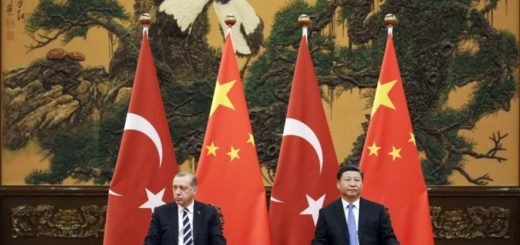Intra-Party Conflict and Future of Nepal’s Relations with India and China

In May 2018, the two communist parties in Nepal, CPN-UML and CPN (Maoist centre), merged together to form the Nepal Communist Party (NCP). But now the ruling party NCP is at the crossroads of a political crisis. The co-chairs of the party, Prime Minister KP Sharma Oli and Pushpa Kamal Dahal are caught in a tug war. Also, a long political instability in Nepal was halted by the merger and now again Nepal is at the brink of going back into political instability.
Amidst the border dispute with India and PM Oli’s discontent towards India against his government, many have analyzed PM Oli to be “pro-China” and NCP Co-Chair Dahal to have been influenced by India to oust PM Oli and induced intra-party conflict. And a recent meeting of Chinese Ambassador to Nepal with senior leaders of NCP has fueled the situation more. Thus more talks have been started in Kathmandu about Indian and Chinese influence in Nepal.
Is domestic/party politics obstructing Nepal’s foreign policy?
The most disastrous incident in Nepal-India relation is the 2015 Economic Blockade by India towards Nepal. This induced among the youths of Nepal high anti-Indian sentiments. Thus, this generated a powerful force for nationalism and created more anti-Indian sentimentalities in Nepal. Moreover, these nationalistic drive cum anti-Indian sentiments were directed towards Nepal’s proximity to China. And China’s development assistance towards Nepal has also enhanced this situation.
There is no doubt that India has had and has political influence in Nepal. In the early 1950s, India had a significant influence in Nepalese politics, and the influence seemed to continue at a different degree and time. Similarly, China’s influence in Nepal through different means, either by economic or cultural, has increased in recent times. Many senior political analysts in Nepal have compared the Chinese Ambassador’s meetings with senior party leaders as of the Indian Ambassadors in the past regarding this NCP party feud.

Concerning Nepal’s relations with India and China, the policy of equi-proximity is the major foreign policy choice of Nepal, a concept guaranteeing a balanced relationship. In the current situation of Nepal-India border dispute, India-China border dispute and intra-party dispute in NCP, and without proper knowledge of China factor, it is harmful to call PM Oli’s government to be “pro-China” and “anti-Indian”. Also, it is not fair to accuse Dahal of having Indian support against Oli.
PM Oli’s unilateral decision to prorogue the budget session of the Parliament, disappointing response to the COVID-19 pandemic and his unilateral actions circumventing the party has have led to the conflict within the party. But deep inside the conflict, the senior leaders are all seeking a bigger role in the party, and by extension, the government.
But whatever the situations and conditions may be in the NCP conflict, the conflict has a direct impact on the foreign policy of Nepal. The factions in the party are the symbol of distrust. Inline to foreign relations, some leaders in the party accuse PM Oli of giving anti-Indian statements publicly and degrading the relations with India, whereas some of the leaders have been praising PM Oli for directly confronting with India and publishing the map including the disputed territories of Nepal.
This imbalance within the party has brought an imbalance in the relationship. This has provided leverage for China regarding the “influence” and the Chinese Ambassador’s activities show it. It also symbolizes that Nepal has shifted the fulcrum away from Nepal regarding the equi-proximal/balanced foreign policy of Nepal.

Future of Nepal’s relations with India and China
“You can change your friends, but not neighbours.”
Regardless of disputes within the party or with any neighbours, Nepal should adopt a balanced relationship with both the neighbours. An “all-party national consensus” should be there regarding the relationship with India and China. Nepal needs the support of both the neighbours for her development and can benefit immensely due to her geostrategic location.
It is not an option for Nepal to side with one of the neighbours and has a feud against another. Hence, the intra-party conflict within NCP should be halted immediately for a harmonious and peaceful relationship with neighbours. Regarding the conflict within the ruling party can only create a space and symbolize neighbours’ influence and Nepal’s inclination respectively.
Whatever the situations in the party, the leaders should have united policies towards the neighbours. Thus, Nepal should have a neutral stance regarding India-China dispute as well, and maintain an equi-proximal relationship with both the neighbours. Also, both India and China should revisit their policies regarding Nepal and maintain a cordial and mutual understanding of foreign policy towards Nepal for the betterment of the whole region.


















